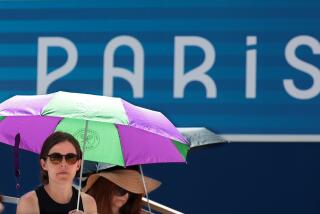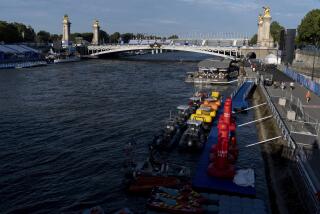Skiing’s Story Line: All About Nothing
- Share via
HAKUBA, Japan — It’s been two days since the opening ceremony and here is what has happened in Alpine skiing:
Nothing.
No gold medals have been awarded, no silver, no bronze.
The heroes have been the snow plowers, who have kept roads clear enough to haul spectators to races that have not been run.
The way this Olympics is headed, Bud Greenspan will return home with a documentary entitled, “16 Days of Lodge Fires.”
Sunday morning, the men’s downhill was postponed just before Italy’s Luca Cattaneo was about to burst from the starting gate. It started snowing then and hasn’t stopped since.
Not to worry. Race organizers had a plan. The downhill was moved to Wednesday and the men’s combined downhill event, scheduled for Monday, was pushed to Tuesday and replaced with the men’s combined slalom, the theory being you could run a slalom in poor weather.
That theory was cooked Monday afternoon when the combined slalom was delayed twice and then postponed because snow had made the course impossible to prepare.
That meant two days lost and the Olympic Alpine clock ticking.
“Twelve events in 14 days,” Diann-Roffe Steinrotter, the former Olympic super-G champion who is doing commentary for TNT, said. “We’re in big trouble.”
Alpine’s inauspicious start has left some wondering about the wisdom of holding an Olympics in a region where weather has long wreaked havoc on ski races.
“Most of the athletes have been to Japan, and we’ve never got races off on time before,” Canadian downhiller Ed Podivinsky said at the base of the men’s downhill course shortly after Monday’s race was postponed. “We all have backup plans, and they’re kicking in right now.”
Japan’s history as an Alpine host?
At the 1993 World Championships in Morioka, weather was the story, not skiing.
“I stood at the top of the super-G with the wind blowing straight at me and I just said, ‘I’ll give it the old college try,’ ” Roffe-Steinrotter recalled.
Several races then were delayed, and after aborted attempts, the men’s super-G was canceled altogether, marking the first time an event was not completed in Olympic or World Championship competition.
In 1996 and 1997, the men’s World Cup downhills were canceled on the Olympic course in Hakuba.
Officials, of course, remain positive.
“Our sweeping troops are going to work,” Ko Yamaguchi, spokesman for the Nagano Organizing Committee said. “Last night our staff was working high in the mountains.”
The men’s downhill is traditionally the first Alpine event so that it can be rescheduled later in the Games if necessary.
“In the history of the Olympic games, all events were held on time,” IOC spokeswoman Michelle Verdier said optimistically.
Perhaps Verdier had not read the latest forecast.
The skies cleared shortly after organizers announced the postponement of Monday’s race, but more snow is expected Tuesday morning, which threatens the women’s super-G, a premiere event, and the rescheduled men’s combined slalom.
“We did know it was going to happen,” Podivinsky said. “They’re starting to get nervous now, the organizing committee. We’re burning up all our reserve days.”
Another problem facing Alpine organizers is that the speed and slalom events are being held at different sites, several miles apart, making it impossible to double up on races. Time to give up hope?
“Not yet,” Podivinsky said. “The last thing you want to do is walk around thinking you’re not going to go.”
More to Read
Go beyond the scoreboard
Get the latest on L.A.'s teams in the daily Sports Report newsletter.
You may occasionally receive promotional content from the Los Angeles Times.







